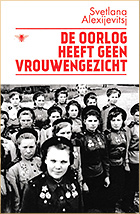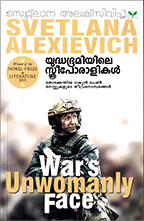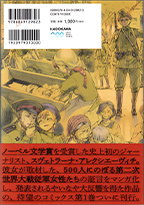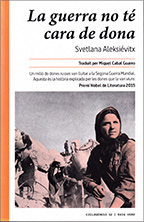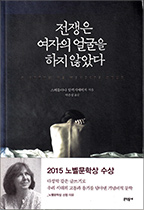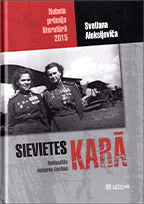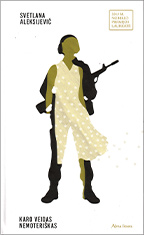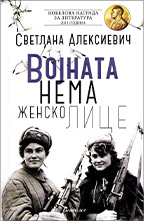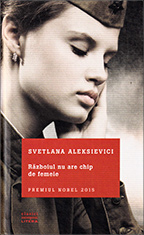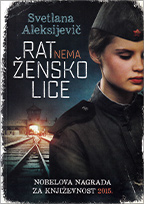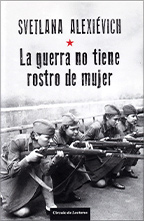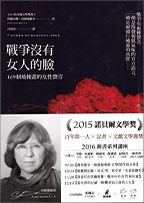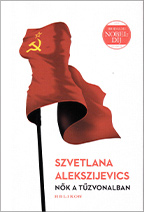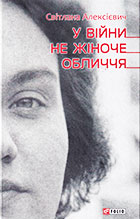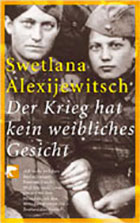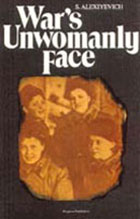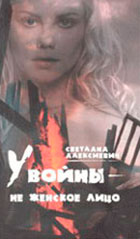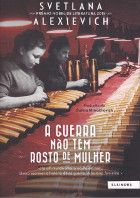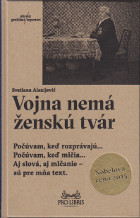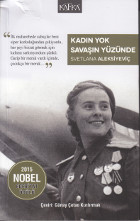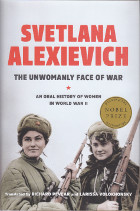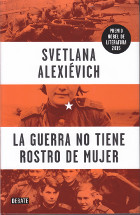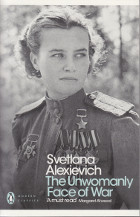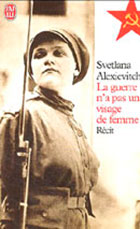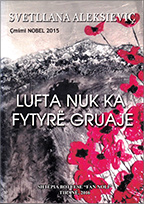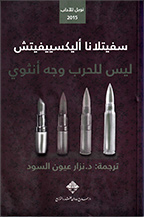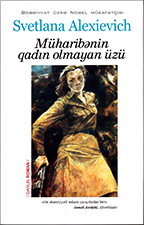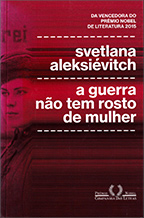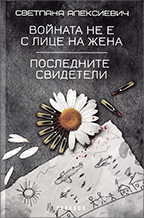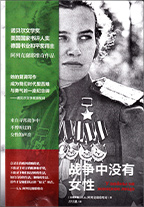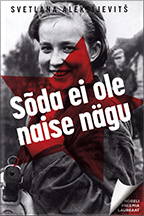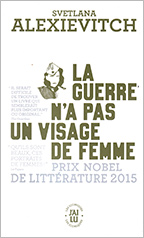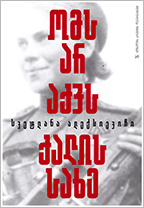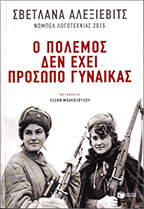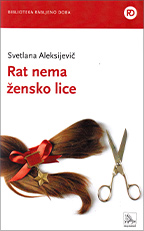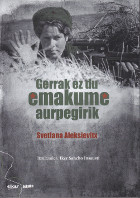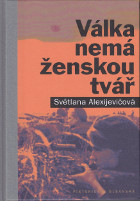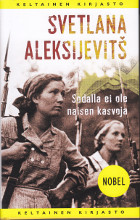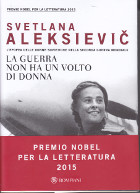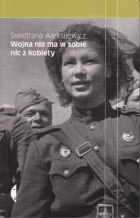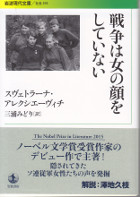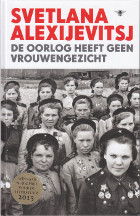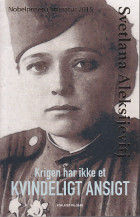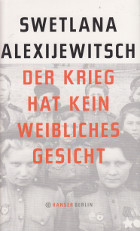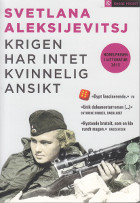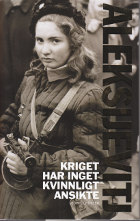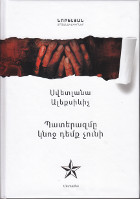Svetlana Alexievich. War’s Unwomanly Face
Proposal
Published by
- Vremya, Russia
- Suhrkamp, Germany
- Plon, France
- Wydawnictwo Czarne, Poland
- Ersatz, Sweden
- Kagge Forlag, Norway
- Palomar, Denmark
- Absynt, Slovakia
- Penguin Random House, Spain
- Paradox, Bulgaria
- Citic, China
- Munhakdongne, South Korea
- Bompiani, Italy
- Patakis Publishers, Greece
- Helikon Publishing, Hungary
- Antares, Armenia
- Tänapäev, Estonia (rights have been reverted)
- Intelekti Publishing, Georgia
- Iwanami Shoten, Japan
- Carobna knjiga, Serbia
- Tao Dan, Vietnam
- Rayo Verde Editorial, Spain (Catalan)
- Mamdouh Adwan Publishing House, Syria
- Fan Noli, Albania
- Companhia das Letras, Brazil
- De Bezige Bij, The Netherlands
- Buzuku, Kosovo (rights have been reverted)
- 20|20 Editora, Portugal
- Grup Media Litera, Romania
- Epsilon, Turkey
- Penguin Random House, USA
- Penguin Classics, UK
- Qanun Publishing House, Azerbaijan
- Owl Publishing House, Taiwan
- Tammi, Finland
- Kostova Antolog, North Macedonia
- Elkar publisher, Spain (Basque)
- Alma littera, Lithuania
- Green Books, India (Malayalam)
- Pistorius & Olsanska, Czech Republic
- Lauku avīze,Latvia
- Založba Goga, Slovenia
- Folio, Ukraine
- Bozicevic, Croatia
- Neyestan, Iran
- Mazmundama, Kazakhstan
During World War II, roughly a million women fought in the Red Army, but their fate has never been recounted. This book assembles the memories of hundreds—they were snipers, drove tanks or worked in field hospitals. Their story is not one of war, not one of combat, but one of men and women in war. What happened to them, how did it change them? What were they afraid of? What was it like to learn how to kill? These women—most for the first time in their lives—tell the story of the non-heroic side of war, which is usually omitted from the stories and memoirs of veterans. They talk about the dirt and the cold, about the hunger and the sexual violence, about anguish and about the ever-present shadow of death. Alexievich lets their voices be heard in her heart-wrenching book. The book was first published in 1985, but the author completely reworked it in 2002, reconstructing passages that had fallen prey to censorship, and introducing new materials that she didn’t dare use at the time.
“Harrowing and moving… Alexievich did an enormous service, recovering these stories… The Unwomanly Face of War tells the story of these forgotten women, and its great achievement is that it gives credit to their contribution but also to the hell they endured.” (Washington Post)
“[A] remarkable collection of testimonies… Sitting at kitchen tables, Alexievich coaxes out of the women stories that describe a reality vastly different from the officially sanctioned version… They speak guardedly but vividly of fleeting encounters, deep relationships, unexpressed feelings.” (The New Yorker)
“A monument to courage… It would be hard to find a book that feels more important or original… Alexievich’s account of the second world war as seen through the eyes of hundreds of women is an extraordinary thing… Her achievement is as breathtaking as the experiences of these women are awe-inspiring.” (The Guardian)
“A revelation… Alexievich’s text gives us precious details of the kind that breathe life into history… In the book, women talk about experiences that no one had written about before Alexievich… As well as showing her readers the war through women’s eyes, Alexievich gives us an idea of how the army women were perceived by society, during the war and afterwards…. These voices, thanks to Alexievich, have themselves become part of history.” (Financial Times)
“Alexievich’s artistry has raised oral history to a totally different dimension. It is no wonder that her brilliant obsession with what Vasily Grossman called ‘the brutal truth of war’ was suppressed for so long by Soviet censors, because her unprecedented pen portraits and interviews reveal the face of war hidden by propaganda.” (Antony Beevor, author of Stalingrad: The Fateful Siege)
‘As with her other books, terrifying documentation meets great artfulness of construction’ (Julian Barnes)
‚Extraordinary… it would be hard to find a book that feels more important or original… Her achievement is as breath-taking as the experiences of these women are awe-inspiring‘ (Observer)
‘One of the most heart-breaking books I have ever read… I urge you to read one if not both of these two extraordinary books’ (The Daily Telegraph)
‚These stories about the women warriors of Mother Russia are a symphony of feminine suffering and strength… Read this book. And then read it again‘ (The Times)
***
Excerpt from the Nobel Lecture 2015:
I’m writing a book about the war… Why about the war? Because we are people of war—we have always been at war or been preparing for war. If one looks closely, we all think in terms of war. At home, on the street. That’s why human life is so cheap in this country. Everything is wartime.
I began with doubts. Another book about World War II…. What for?
On one trip I met a woman who had been a medic during the war. She told me a story: as they crossed Lake Ladoga during the winter, the enemy noticed some movement and began to shoot at them. Horses and people fell under the ice. It all happened at night. She grabbed someone she thought was injured and began to drag him toward the shore. “I pulled him, he was wet and naked, I thought his clothes had been torn off,” she told me. Once on shore, she discovered that she had been dragging an enormous wounded sturgeon. And she let loose a terrible string of obscenities: people are suffering, but animals, birds, fish—what did they do? On another trip I heard the story of a medic from a cavalry squadron. During a battle she pulled a wounded soldier into a shell crater, and only then noticed that he was a German. His leg was broken and he was bleeding. He was the enemy! What to do? Her own guys were dying up above! But she bandaged the German and crawled out again. She dragged in a Russian soldier who had lost consciousness. When he came to, he wanted to kill the German, and when the German came to, he grabbed a machine gun and wanted to kill the Russian. “I’d slap one of them, and then the other. Our legs were all covered in blood,” she remembered. “The blood was all mixed together.”
This was a war I had never heard about. A woman’s war. It wasn’t about heroes. It wasn’t about one group of people heroically killing another group of people. I remember a frequent female lament: “After the battle, you’d walk through the field. They lay on their backs… All young, so handsome. They lay there, staring at the sky. You felt sorry for all of them, on both sides.” It was this attitude, “all of them, on both sides,” that gave me the idea of what my book would be about: war is nothing more than killing. That’s how it registered in women’s memories. This person had just been smiling, smoking—and now he’s gone. Disappearance was what women talked about most, how quickly everything can turn into nothing during war. Both the human being, and human time. Yes, they had volunteered for the front at 17 or 18, but they didn’t want to kill. And yet–they were ready to die. To die for the Motherland. And to die for Stalin—you can’t erase those words from history.
The book wasn’t published for two years, not before perestroika and Gorbachev. „After reading your book no one will fight,” the censor lectured me. “Your war is terrifying. Why don’t you have any heroes?” I wasn’t looking for heroes. I was writing history through the stories of its unnoticed witnesses and participants. They had never been asked anything. What do people think? We don’t really know what people think about great ideas. Right after a war, a person will tell the story of one war, a few decades later, it’s a different war, of course. Something will change in him, because he has folded his whole life into his memories. His entire self. How he lived during those years, what he read, saw, whom he met. What he believes in. Finally, whether is he happy or not. Documents are living creatures–they change as we change.
I’m absolutely convinced that there will never again be young women like the war-time girls of 1941. This was the high point of the “Red” idea, higher even than the Revolution and Lenin. Their Victory still eclipses the GULAG. I dearly love these women. But you couldn’t talk to them about Stalin, or about the fact that after the war, whole trainloads of the boldest and most outspoken victors were sent straight to Siberia. The rest returned home and kept quiet. Once I heard: “The only time we were free was during the war. At the front.” Suffering is our capital, our natural resource.. Not oil or gas—but suffering. It is the only thing we are able to produce consistently. I’m always looking for the answer: why doesn’t our suffering convert into freedom? Is it truly all in vain? Chaadayev was right: Russia is a country without memory, it’s a space of total amnesia, a virgin consciousness for criticism and reflection.
But great books are piled up beneath our feet.
